I've been reading the book On Vegetables lately and it has some great simple ways to enjoy vegetables such as this Daikon radish recipe which I tweaked just slightly. Just a few simple ingredients, little prep, and some easy cooking nets a beautifully delicious side dish.
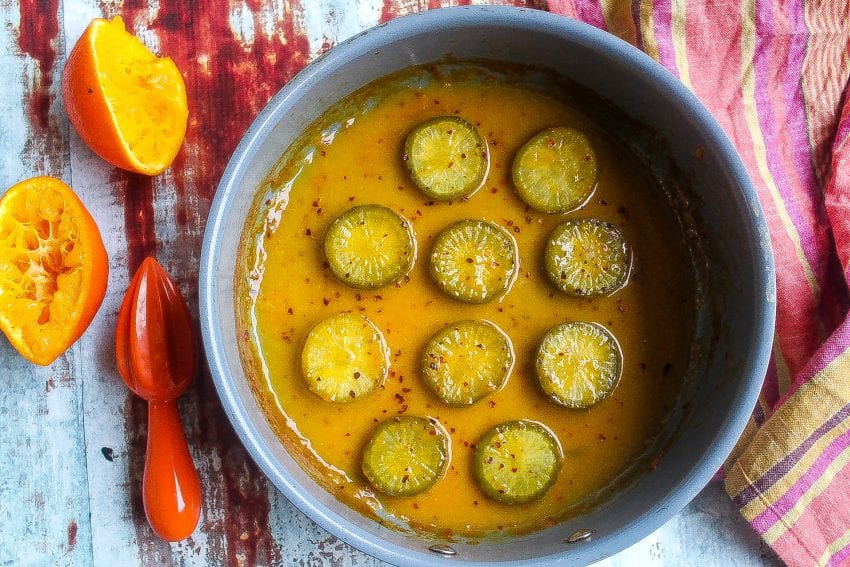
Musical Inspiration for Braised Daikon Radish
Rapper/Singer Phonte released a new album last month called No News Is Good News. Besides the usual dope beats and lyrics, I've had this one in heavy rotation given its subject matter. Phonte tackles issues of diet and the connection to long-term health lamenting on the track "Expensive Genes" the increasing number of African Americans dying young due to diet habits.
It's like 40 years old is ¾ life. Our biggest fears were shots or armed robbery, Now the biggest fears are clots and oncology. The poignant and straight-shooting lyrics are a strong reminder of the control that we have on our health.
What Is Daikon?
Daikon, also known as white radish, is an Asian root vegetable popular in Japanese, Chinese, and Korean cuisine. It resembles a funny looking thicker carrot, but white. You can also find purple and green variations such as the ones featured in this post.
Braised Daikon Radish Ingredients
The ingredients are few; just daikon, orange juice, and a few spices.
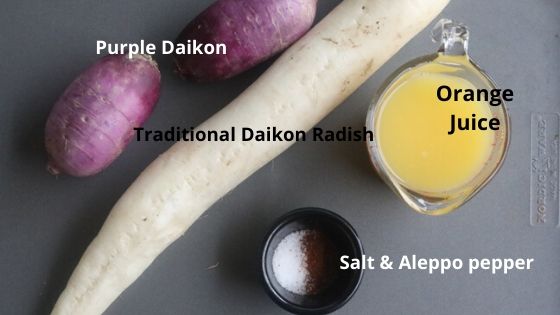
How to make braised daikon (step by step)
Step 1: Add OJ, Radish, and Salt to Pan
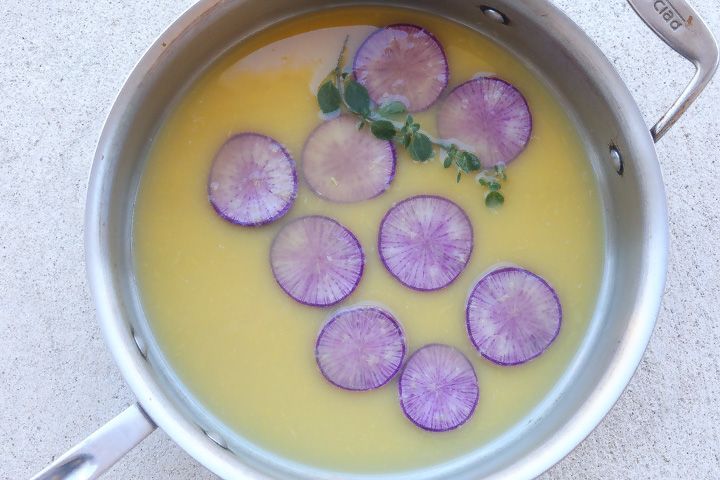
Step 2: Cook
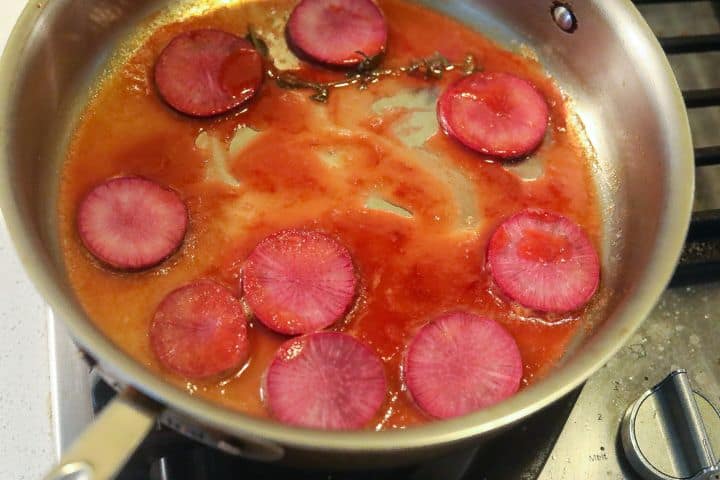
Step 3: Baste the daikon
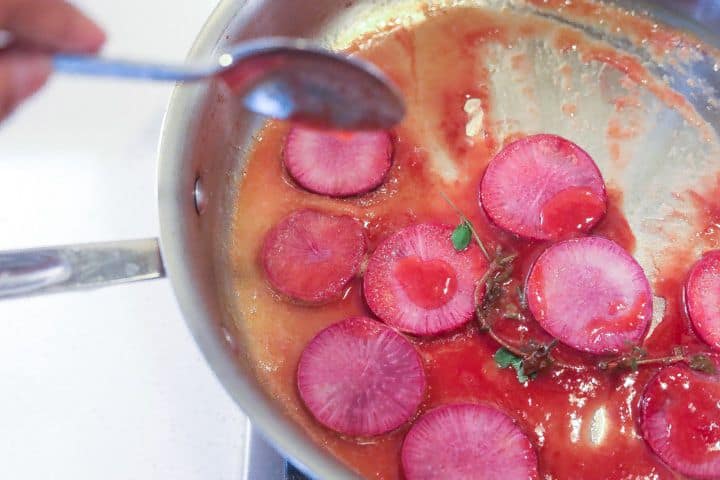
Step 4: Finish with Aleppo
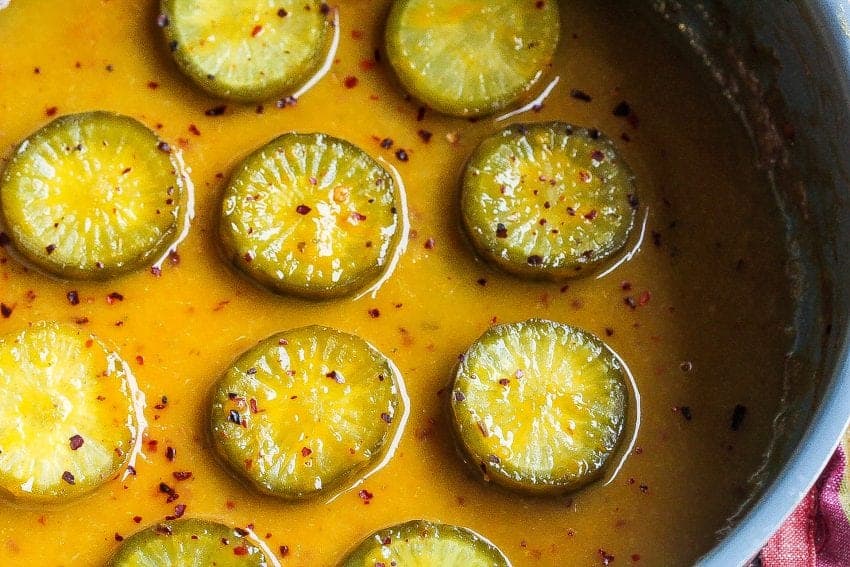
Serving Suggestions:
I add Aleppo pepper as the finishing ingredient typically. Basically I like to add a sweet heat. I like daikon as part of a vegetable centric meal that is centered on Asian cooking.
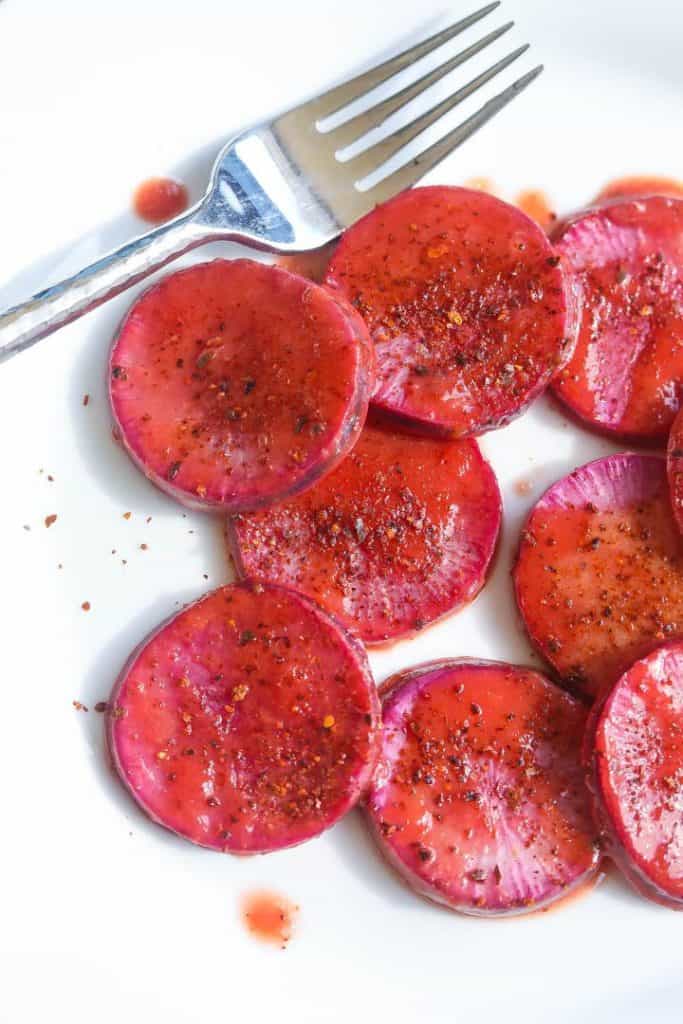
Expert Braised Daikon Cooking Tips
- If available use a mandolin to slice the daikon easily and evenly
- Cooking time will be determined by thickness of the slices. If cut too thin, the radish will be saturated. If too thick, there will not be enough absorption
- Do not cook on too high a level of heat. The juice will get gummy fast and not have enough time to infuse the daikon with flavor
- All daikon radishes work in this recipe whether you have green, purple, or white available to you. If daikon is not available in your area, try using a different kind of radish.
- Note one daikon root has a range of flavors: (1) the part closest to the leaves is said to be the sweetest, (2) while the end of the root has the most bite to it (3) and the middle is somewhere in between.
- Daikon doesn’t necessarily have to be peeled, but they do need a good scrubbing.
Frequently Asked Questions (FAQs)
What does daikon radish taste like?
Cooked daikon radishes are somewhere between onions and turnips on a pungency scale making them a great complement to the sweetness of fresh orange juice.
By cooking them via a slow simmer, you can coax out a mellow sweetness with just a hint of the peppery daikon flavor. The long braise brings about a comforting flavor with a soothing texture.
The Aleppo pepper is added as a finishing touch for color and also some more savory notes. Aleppo is very mild so there are no heat concerns, but it has cumin like earthiness and a slight saltiness.
What are some meal planning tips for braised daikon?
- As a root vegetable they keep very well in the refrigerator so you can plan to cook later in your planning cycle
- These are great warm, but also chilled as leftovers.
What Key Equipment Are Needed for Braised Daikon?
These aren't required, but they will definitely speed things up and help you maximize efficiency.



For other recipes you might like try these:
- Smoked carrots
- Daikon Radish Salad
- Curried Collard Greens
- Baked Purple Potato Fries
- Sous Vide Pineapple Glazed Radishes
If you make this easy braised daikon radish recipe or any other from the site, please come back and leave me a comment below with your feedback. Definitely take a photo of the dish and be sure to tag #foodfidelity so that I can see them.
You can also keep up with my food exploits as well as original recipes! You can find me on Instagram, Facebook, Twitter, and Pinterest. If you like any of the music you find on the site, visit me at Spotify to find curated monthly playlists.
Ingredients
- 1 large daikon radish cut into ½ inch slices
- 2 ½ cups strained fresh orange juice
- 2 teaspoons kosher salt
- 1 teaspoon Aleppo pepper optional
Instructions
- Combine daikon, orange juice and salt in a pan in a single layer.
- Set pan over medium heat and cook until orange juice evaporates below the surface of the daikon
- Flip the slices carefully after about 20 minutes, as they will be soft and you don't want to break them.
- After about 10 minutes began continuously basting the daikon by spooning the reduced OJ on top.
- Add Aleppo the last minute or so of cooking and then serve.
Notes
- If daikon is not available in your area, try using a different kind of radish.
- Note one daikon root has a range of flavors: (1) the part closest to the leaves is said to be the sweetest, (2) while the end of the root has the most bite to it (3) and the middle is somewhere in between.
- Daikon doesn't necessarily have to be peeled, but they do need a good scrubbing.
- Use a mandolin slicer to ensure evenly cut pieces and to cut down on prep time

